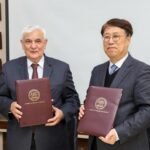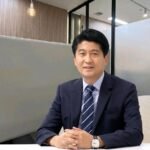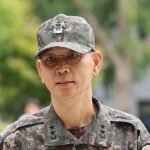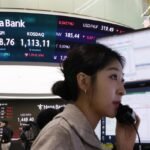LG Electronics CEO Cho Joo-wan speaks to reporters at IFA 2024 in Berlin (Courtesy of LG Electronics)
BERLIN – Cho Joo-wan, CEO of LG Electronics Inc., said the South Korean home appliances leader will adjust its premium-oriented strategy and expand its mass market product lineup to better compete with Chinese rivals.
“We should no longer downplay Chinese home appliances, but need to be afraid of them,” Cho told reporters in a news conference on Sept. 6 on the sidelines of IFA Berlin 2024. IFA Berlin is the world’s largest consumer and electronics show.
At IFA 2024, he witnessed the significant narrowing in the gap with Chinese rivals such as TCL and Highsense, which showcased some of the world’s first and world’s largest products for the event.
“We need to be on high alert (to Chinese companies) from the perspective of product diversification,” Cho added.
In the global robot vacuum cleaner market, LG is trailing China’s Roborock, the world’s No. 1 robot vacuum cleaner brand.
To maintain its leadership in the home electronics market, Cho said that it will
increase its product affordability to 70-90% of the customer group, from its current target of 60%.
“We must not follow the footsteps of Japanese companies that lost market share to us by maintaining a premium strategy, not producing cost-effective products,” he noted.
LG Electronics CEO Cho Joo-wan looks around its exhibition booth at IFA 2024 in Berlin (Courtesy of LG Electronics)
COMMUNICATION WITH GLOBAL INVESTORS
After the IFA 2024, he will fly to London to meet with global investors and share its business achievement and portfolio in detail as it is transforming into an AI-based company with a focus on future mobility, robots and smart factories.
“In the home appliance sector, played down as a mature market, we have achieved a growth rate of over 10% for several years with an operating profit margin close to 10%,” Cho told reporters
“We have a balanced business portfolio, with business-to-business transactions accounting for 35% of total sales. We will actively share these details (with investors),” he said.
In May, Cho met with global investors in the US as part of the company’s efforts to boost communication with investors and achieve a fair valuation.
In the second quarter, LG posted its highest quarterly profit of 1.2 trillion won ($868 million), up 61.2% on-year.
But its share price has slid 10.4% to close at 103,400 won on Monday since the earnings release on July 25, in line with the wider Kospi market’s decline of 10.8% over the same period.
LG Electronics’ robot cleaners
To strengthen its AI push, LG has been collaborating with the Big Tech such as Google, Microsoft and Qualcomm. As an example, it in June unveiled home robots featuring Google’s AI intelligence model GeminiAI.
Cho recently held a one-on-one meeting with Microsoft CEO Satya Nadella, after sitting down with him in a Microsoft CEO summit.
“We discussed in what areas we can make good use of AI and what its potential is,” he said in reference to the one-on-one meeting with Nadella.
LG is also exploring cooperation with Qualcomm to develop infotainment technology. LG is the US chipset maker’s biggest customer among automotive electronics makers.
“We will discuss with Qualcomm how we will realize the evolving AI in vehicles,” Cho added.
INDIA UNIT IPO
Regarding an IPO of LG Electronics’ Indian arm, he reiterated that its IPO is one of several options under consideration and nothing has been confirmed about its trading debut on the Indian stock market.
“In India, LG has been a household brand, so we’re considering various options with a vision of becoming a national brand. We’re aiming to triple sales in India by 2030,” Cho said.
By Eui-Myung Park
uimyung@hankyung.com
Yeonhee Kim edited this article















